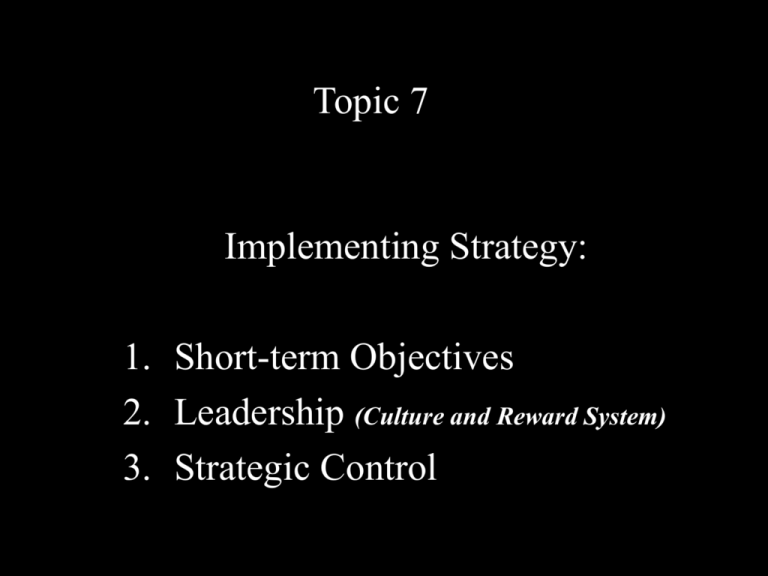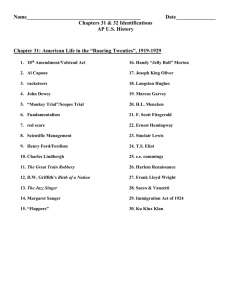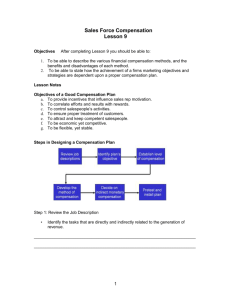Implementation Control
advertisement

Topic 7 Implementing Strategy: 1. Short-term Objectives 2. Leadership (Culture and Reward System) 3. Strategic Control Strategy Implementation Strategy Formulation “Planning your Work” Strategy Implementation “Working your Plan” Role of Short-Term Objectives in Implementing Strategy 1. “Operationalize” long-term objectives 2. Raise issues and potential conflicts that require coordination among divisions 3. Identify measurable outcomes of functional activities Qualities of Effective Short-Term Objectives Measurable Priorities Linked to long-term objectives Strategic Leadership: Embracing Change Activities involved in solidifying commitment to change Shaping organizational culture Designing Effective Rewards … What is Organizational Culture? The set of important assumptions (often unstated) that members of an organization share in common. Organizational Culture Common ways to manage or create: •Emphasize key themes or values •Encourage stories/legends about core values •Institutionalize reinforcements •Make common themes unique Example: Features of the Corporate Culture at Wal-Mart … • Dedication to customer satisfaction • Zealous pursuit of low costs • Belief in treating employees as partners • Sam Walton’s legendary frugality • Ritualistic Saturday morning meetings • Executive commitment to – Visit stores – Talk to customers – Solicit employees’ suggestions Design Effective Rewards … Remember agency theory? Executive Bonus Compensation Plans The goal of an executive bonus compensation plan is to motivate executives to achieve maximization of shareholder wealth – the underlying goal of most firms Executive Bonus Compensation Plans Major Plan Types Stock Options Restricted Stock Golden Handcuffs Cash Golden Parachutes Types of Executive Bonus Compensation Plans Bonus Type Description Rationale Shortcomings Stock option grants Right to purchase stock in the future at price set now. Compensation is determined by “spread” between option price and exercise price Provides incentive for executive to create wealth for shareholders as measured by increase in firm’s share price Movement in share price does not explain all dimensions of managerial performance Restricted stock plan Shares given to executive who is prohibited from selling them for a specific time period. May also include performance restrictions Promotes longer executive tenure than other forms of compensation No downside risk to executive, who always profits unlike other shareholders Bonus Compensation Plans (contd.) Bonus Type Description Rationale Shortcomings Golden Handcuffs Bonus income deferred in a series of annual installments. Deferred amounts not yet paid are forfeited with executive resignation Offers an incentive for executive to remain with the firm May promote risk-averse decision making due to downside risk borne by executive Golden parachute Executives have right to collect the bonus if they lose position due to takeover, firing, retirement, or resignation Offers an incentive for executive to remain with the firm Compensation is achieved whether or not wealth is created for shareholders. Rewards either success or failure Bonus Compensation Plans (contd.) Bonus Type Cash based on internal business performance using financial measures Description Bonus compensation based on accounting performance measures such as return on equity Rationale Offsets the limitations of focusing on market-based measures of performance Shortcomings Weak correlation between earnings measures and shareholder wealth creation. Annual earnings do not capture future impact of current decisions What is Strategic Control? Tracks a strategy as it is implemented, detects problems or changes in its underlying premises, and makes necessary adjustments Definitions of Strategic Controls 1. Premise Control – Designed to check systematically and continuously whether premises on which the strategy is based are still valid (primarily environmental and industry) 2. Strategic Surveillance – Designed to monitor a broad range of events inside and outside the firm that are likely to affect the course of its strategy Definitions of Strategic Controls 3. Special Alert Control – Thorough, and often rapid, reconsideration of the firm’s strategy because of a sudden, unexpected event 4. Implementation Control – Designed to assess whether the overall strategy should be changed in light of the results associated with the incremental actions that implement the overall strategy – – monitor strategic projects milestone reviews





